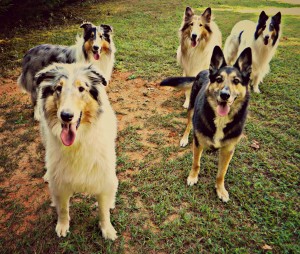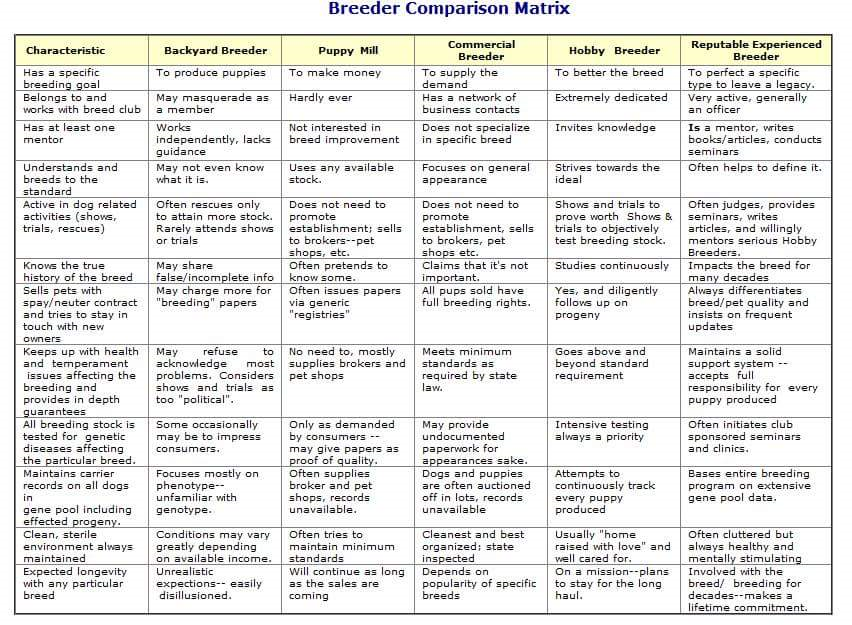The Chosen Ones: Breeder, Rescued or Both?
I feel like I am about to write about politics or religion or something equally controversial. This subject is so volatile, that I expect to lose a reader or two and probably be called some names that won’t make it to the comments section. Asking my Facebook page members where they got their dogs and why, resulted in more than 5000 people seeing my question and more than 100 responses. Surprisingly, I only had to delete two of those responses. I appreciate the tempered opinions on what is such an emotional subject. So I write this with full awareness.
Until the last not quite three years, all of my dogs have been rescues from various sources. I even ran a Doberman rescue for many, many years. But as regular readers know, after losing my heart dog, Merlin, I got the opportunity to be gifted with a wonderfully bred dog now known as Kenzo. You can read about that here if you so desire: Introducing Kenzo. So I fully get the emotional response that such a subject brings to those passionate about rescue. But despite the fact that rescue has always been a part of who I am, I have never accepted that all breeders should be painted with the same brush. Running a purebred rescue, I never viewed responsible breeders as the enemy because I met some of them. Responsible breeders are who started most original purebred rescues to help save the creations of their not so responsible counterparts. Despite what some of you believe or have read, responsible breeders are not the cause of shelter dogs dying no more than being a cat person is. It’s an absurd idea that needs tossed to the curb.
Adopting a dog from a rescue or shelter or a re-homing situation is an honorable action. As I mentioned, all of my canine kids up until Kenzo have come to me via varying rescue situations. I took in my first dog, Samantha, from a past friend who got a puppy at the same time as having a baby. Layla, my second dog, was found wandering the streets and rescued by my neighbor’s child, while I was still mourning my first dog. When no one claimed her, I gratefully called her mine. Merlin and Kera were both adopted mere months apart from the shelter at which I spent much time volunteering. Siri came to me as a foster puppy who never left, one of seven rescued from the irresponsible owner of a purebred dog who had an “oops litter” with the neighbor’s dog. Trent belonged to someone I knew who sent him into a rescue of my suggestion, when a baby’s allergy made keeping him impossible. The rescue turned out to be a hoarder and he came to me, never to leave. I have personally fostered literally more than a hundred dogs. Some ended up becoming family, even if for a short time. Damon, who my Doberman rescue was named for, was my foster failure for almost a year before I lost him to Wobblers.

From the front, left to right: Luigi, Miley ( GSDX Rescue ) Gianna, Chesney and Denzel. Photo courtesy of Suzy Augello.
I will always have a rescued dog, very likely several rescued dogs. I love making a connection with a dogs who need help and watching them blossom with love and proper care. It’s an amazing feeling. If I had more humans in my home and more money and more time and more space (don’t we all say that?), I would have far more dogs than I should. Facebook shares are hard on the soul, with all the dogs in need. But my first responsibility is to my current dogs and I would never add a family member that would cause them too much stress. Read more on that subject here. The fit should be appropriate so that responsibility limits my desires. When the time comes, I will be on Petfinder looking for my next crew member.
Every dog person I know has a bucket list of dogs that they want to “have” before they die. I have not fulfilled mine yet. So I won’t rule out getting another responsibly bred puppy at some time in my life. Despite what you hear some rescuers state, you cannot find every kind of purebred dog in a shelter or rescue. There are hundreds of breeds that many people have never heard of, who are never going to find themselves in a shelter. Someone wants those breeds and that is okay. Everyone has the right to choose the dog breed that feels right to them. Some people choose breeds for utility such as herding sheep, guarding livestock, helping to hunt, and even guide dogs. Working lines, as they are called, are bred for generations for their jobs. There is nothing wrong with that. Working dogs, cared for properly, are a joy to watch.
Responsibly bred dogs are not causing dogs to die in shelters. Irresponsible breeders and irresponsible owners are. Insufficient laws addressing breeding are responsible for the over-population problem in this country. Lack of education in proper care and training of dogs are among the many reasons that dogs are surrendered to shelters or rescues. A throw away society that wants a quick fix is prevalent in the American culture. None of these reasons are conducive to long term commitments for the lifespan of a dog. Shelters and rescue groups exist because of the irresponsible and uneducated, not the responsible.
Stable temperaments and sound health are the hallmarks of a responsible breeder. Without them, the future of dogs is in jeopardy. Breeds that you know and love, will cease to exist without responsible breeders. Learning how to identify responsible breeders and how involved they are in the lives of the dogs that they create could be a pleasant eye opener.
Buying a puppy from a responsible breeder should involve en extensive questionnaire. You will be thoroughly screened with references checked and multiple phone calls back and forth before you are approved. You will meet in person or see via Skype/Zoom/etc., the puppy’s parents. You will get the appropriate health testing information for the breed. You will get questioned on your lifestyle and whether you are a good match for the dog in question. The breeder will have an ironclad and extensively worded contract with requirements that you must meet for the dog’s lifetime as well as a requirement to return the dog at any time in his or her life, should there be a need to do so. You will be asked to contact them throughout the dog’s life for questions on diet, exercise, health and any other subject that you can think of that pertains to your choice.
This chart can help people understand the difference between the type of breeders that exist. Supporting the last two columns should be your goal. Support of the other types of “breeders” is part of the problem, not part of the solution.
At this point, some of my rescuer readers are probably wondering if the above is a commercial for breeders. Not at all. It’s simply an attempt to educate that responsible breeders are not the enemy. Backyard breeders, commercial breeders, puppy mills and pet stores that treat dogs like a commodity rather than living sentient beings are the enemy. Don’t confuse them with each other. The goal of humane educators should be focused on eliminating the need for the aforementioned sources of irresponsibly bred puppies.
Since I procrastinated while writing this blog post, I had the opportunity to be thoroughly appalled and disgusted at what was meant to be a Super Bowl ad for Go Daddy. This sad excuse of an ad portrays a “family” who sells puppies online, with no regard for who they get sold to. This is not a responsible breeder. See above chart once again. Because of the huge outcry from dog lovers everywhere, the ad was pulled. This shows you do have a voice. Use that voice wisely. Don’t generalize. Support responsibility on the part of breeders and rescuers alike.
That brings me to responsible rescue practices. All rescues and rescuers are not created equal. Rescues should have a decent screening process, with a basic questionnaire, a home visit, behavior and medical screening and treatments before placement, as well as putting the utmost effort into making appropriate matches for both sides of the equation. A good rescue will also be present for you for the lifetime of the dog. Responsible shelters offer the same comfort. What rescues and shelters should not do is be too stringent so that good solid homes get turned down for reasons such as no fences, working a regular job, having children, etc. Obviously, some dogs will require a fence, some will require no kids, some will need more attention than others. But blanket statements and requirements that are rigid, regardless of the validity of the home, help no one but irresponsible breeders. Then there is the opposite end of the rescue spectrum; the rescuers who screen no one, adopt out intact and unhealthy animals as well as those with unaddressed behavior problems to people ill equipped to handle them. Read more about that subject here: Saving Them All: At What Cost?
.
Responsibility is important on all sides of this equation. The only solution to this is education. Make it your goal to know more and you will make more informed decisions. That is always going to be a good thing. Diversity is also a good thing. Allow people their individuality. Judgments on others for their choices won’t help educate. So leave your ego at the door and please share your story on your canine choices in a respectful manner. Rudeness will not get your comments listed. Thanks in advance!
Posted in: Projects
Leave a Comment (19) →

